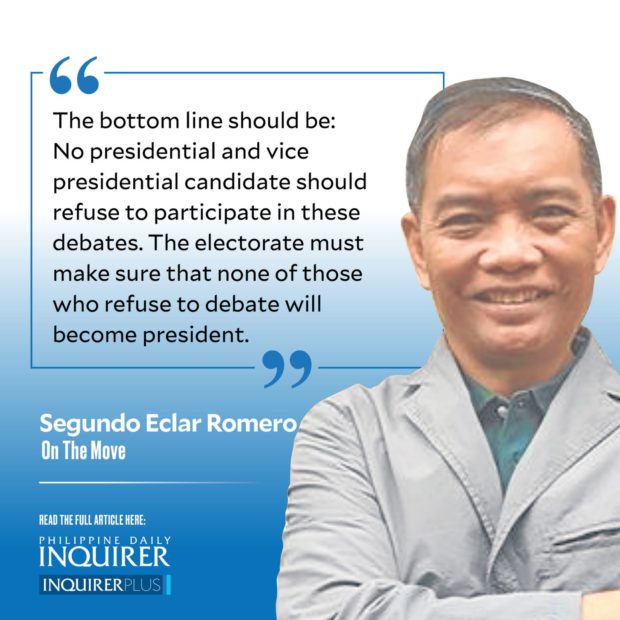No debate, no win
Last Wednesday, presidential candidate Ferdinand Marcos Jr. and vice presidential candidate Sara Duterte were asked during their “Virtual Caravan” forum by a former SK federation official: “As President and Vice President, how do you intend to use your respective offices as platforms to spring young people into action and become part of nation-building? Drawing from your LGU experiences, are there Ilocos province and Davao City programs that you wish to scale up to further activate youth engagement in nation-building and combat disinterest in our youth?”
Marcos Jr. talked about post-pandemic job creation for the youth, especially in agriculture and tourism. Sara Duterte had more specific ideas—she will make military training mandatory for all 18-year-olds. She had in mind the youth military training in South Korea and Israel. She also talked about the need to scale up community youth emergency response training that they have begun to organize in Davao City.
I would have expected Marcos Jr. and Sara Duterte to talk from a common, agreed-upon UniTeam Alliance platform, but apparently, they had separate “platforms.” Marcos Jr. was the first to speak, only to ask tentatively, who will answer first? As if waiting for a cue from Sara Duterte. Then he went on to answer the question. In my mind, this episode betrays a certain confusion about the relationship of the president and the vice president in the minds of candidates and the people.
Sara Duterte should prepare for a radical diminution of her “presence” at the top. Not only will she not have her own “platform” as vice president; worse, she might be hemmed in by the legacy-inspired “platforms” of Marcos Jr.’s mother Imelda Romualdez Marcos, sister Imee Marcos, and wife Liza Marcos.
But Sara Duterte’s idea of mandatory military training for 18-year-olds should be taken seriously. The proposal will affect approximately two million Filipinos of both sexes who belong to this age category annually. Debating the idea is a good way of assessing the depth of the knowledge and insight behind these pronouncements by candidates for the top elective positions in the land. More importantly, it is a timely provocation of serious discussion on the national security situation and national security strategy in the country.
All the candidates for president should articulate their proposed national security strategy and the modifications in systems and structures this strategy will entail. The president is the primary architect of national security and foreign policy. The external security challenges the country faces in the West Philippine Sea and the internal security challenges relating to terrorism and insurgency are required topics for elucidation by all presidential candidates. The reason this is so critical and urgent is that many national security experts have bemoaned the lack of coherent and far-seeing national security and national defense strategies in the country.
This is an opportunity for Sara Duterte, a colonel in the Army reserve force, to show her familiarity with the comprehensive and detailed law that governs this subject, Republic Act No. 7077 that was signed into law in 1991 entitled “An Act Providing for the Development, Administration, Organization, Training, Maintenance, and Utilization of the Citizen Armed Force of the Armed Forces of the Philippines and for Other Purposes.”
She should help the citizens understand why the mandatory college-level Reserve Officers’ Training Corps program was botched by corruption in the AFP and got scrapped in 2002, and why mandatory military training and the citizen armed force ideas, while not new, have remained unfeasible due to the lack of, among others, organizational capacity in the armed forces to make them happen.
The campaign trail is a good process for picking out the key issues and topics for the series of national election debates planned by the Commission on Elections. They are part of the mechanisms for enabling the candidates to elaborate on their platforms and for the audience and the media to test the soundness and resonance of these platforms with the needs and expectations of the people and the national interest.
The bottom line should be: No presidential and vice presidential candidate should refuse to participate in these debates. The electorate must make sure that none of those who refuse to debate will become president.
—————-
doyromero@gmail.com





















